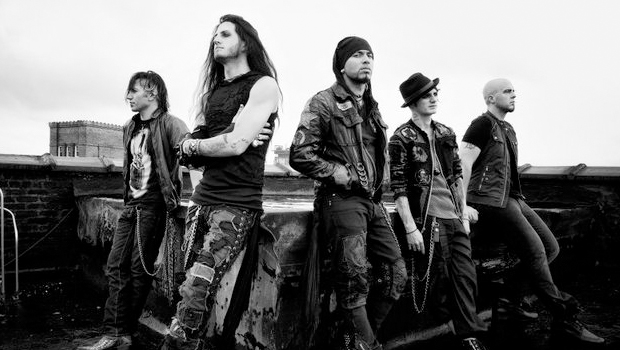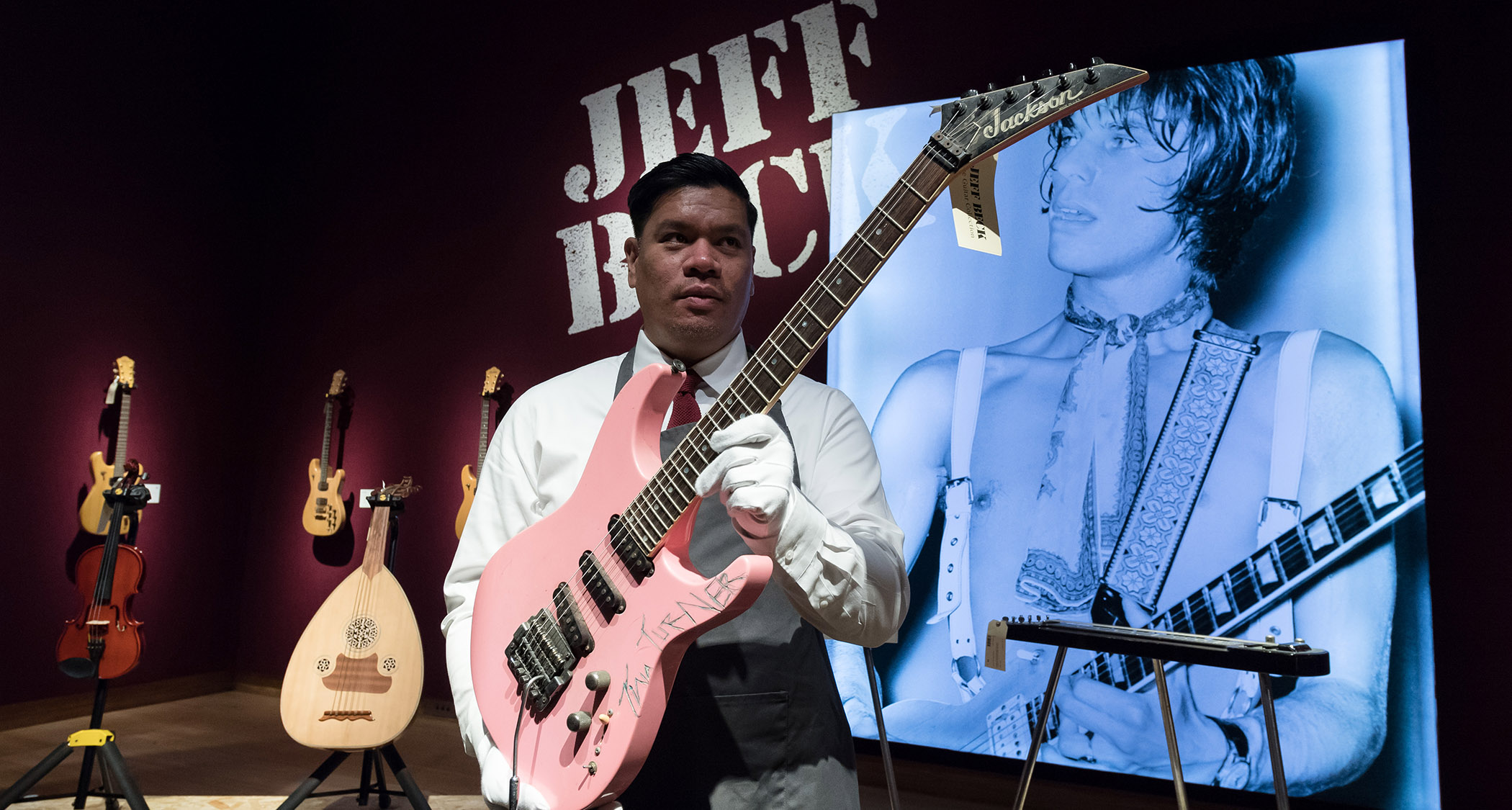
The first album from Michigan's Pop Evil, Lipstick on the Mirror, established them as one of the brightest up-and-coming bands of the late '00s. Leigh Kakaty's vocals and the guitars of Tony Greve and Dave Grahs proved edgy enough to plant them firmly outside the realm of soundalike radio rock, yet hooky enough to inspire a few embarrasing sing-along moments in the car.
Pop Evil's latest effort, War of Angels, sees the band beefing up their sound and displaying a good deal of growth and maturity that's a paramount example of why it's a shame the big labels don't give bands time to develop anymore.
The first single, "Last Man Standing," was such a convincing anthem of struggle and perseverance that it was scooped up almost immediately by the UFC for use around a heavyweight clash between Frank Mir and Mirko "CroCop" Filipovic. If that's not representative of the hard-hitting (pun intended) nature of War of Angels, what is?
Guitar World recently got the chance to talk to Pop Evil guitarist Tony Greve about War of Angels, the perils of major labels, cage fighting and his love of Dimebag Darrell.
GUITAR WORLD: So War of Angels was set to come out back in February ...
I know, man, I'm shocked that a label that big just came through in no way. But if anything, it's a blessing in disguise because we're in a good spot now [with E1.]
So when the album date was pushed back, you guys didn't really say much other than it was due to "reasons beyond our control." Can you elaborate a little more on that?
All the latest guitar news, interviews, lessons, reviews, deals and more, direct to your inbox!
We signed with Universal Republic, and the deal was that they didn't want to put too much into that album. They didn't want to push it, they wanted to wait til the next album. So they put us in the studio and we recorded the new album with Johnny K, who was absolutely phenomenal.
So the label put up money to record this album, and then we got done with it they said, "Well, there's no hits on it. We don't want to push it." So for us, we just wanted to get out of that. We didn't want them to put the album out and then do no marketing for it; we wanted as many people to hear about the band and the album as we could. We wanted these songs to get the fair shots they deserve.
The first single from the album, "Last Man Standing," actually came out last fall. It was released with a special training video from former UFC heavyweight champion Frank Mir. How did that come about?
The song had pretty much just come out at the time. They heard it, loved it and contacted us and wanted to use it. And for us it was like, "What an honor." This guy's gonna go out and whoop some ass to "Last Man Standing" ... that's awesome!
And he did win the fight, which is important ...
[Laughs] "Come on Frank, don't make us look bad. Don't lose!"
So getting to the new album, the guitar tone on the album really stands out as something cool. Talk a little about the gear you used.
We did a lot of cool things on this record that I never really had the chance to experiment with before, and a lot of it has to do with being in Johnny's studio out in Chicago. The amount of guitars and amps that guy has in his studio is ridiculous, and we got to try out so many different options.
Most of the rhythms on the album we tracked with a Diesel amp and a Peavey at the same time, and those two heads really set the tone for the whole album.
We use a ton of different guitars for different parts of songs to get certain sounds to try and really capture each part individually and make each part its own.
I'm a Dean player, though; I've got it tattooed on my wrist, man. I'm a lifer.
[Laughs] That's a pretty high level of committment ...
For me it was always inspired by Dimebag. I remember I was like 13 and my mom took me to a guitar store to get a new guitar, and she told me to try out a bunch of different ones. I said, "No, it has to be a Washburn!" [Laughs] Because that's what he was playing at the time. It has to sound awesome, otherwise why would he be playing it?
She tried to tell me it was because he was a good guitar player and it had nothing to do with the guitar, but I was convinced that was the only way I'd ever get those tones. But that guitar ended up getting smashed, so I guess that was all irrelevant anyway. [laughs]
The rhythm sound, even in the dropped tunings, maintains a really high level of clarity throughout the album. When I hear the term "dropped tunings," a really bassy, muddy sound comes to mind, but you managed to maintain a really strong mid-range punch.
Thanks, man. A lot of that, I think, was the tone we had dialed in. I never understood why you'd want to put something in that someone can't quite hear, where they can't quite understand what you're doing. Every note you play should mean something. I mean, if it sounds bad, I understand why you'd want to cover it up, but I would think you would want people to hear what you're doing.
You're using drop tunings on most of the album, right?
Yeah, like "Last Man Standing" is tuned down to drop-C. A lot of the songs on the album are in a bunch of different tunings; there's drop-C, there's D-flat dropped, standard.
I noticed with writing these songs that I would play around with different tunings and when I could come up with a cool riff and try to play it in a standard tuning it would lose its feel; it would totally change the sound. So whatever tuning the songs are in on the album is what they were written in.
Speaking of "Last Man Standing," the tuning on that was another thing influenced by Dime. I was working on learning some songs from The Great Southern Trendkill, which is probably my favorite Pantera album by far, and once I got through the book, I thought, "What can I come up with in this kind of tuning?" And when I was kind of vibing on that album, "Last Man Standing" was the riff I came up with.
So Dimebag is definitely a hero of yours. Talk about some of the other guitarists who influenced you. I know, for me, that "Daisy Chain" sounds a lot like the Cult.
Dude, it's so awesome that you said that! Dave, our other guitar player, wrote that song. He came up to us and said, "I've got this riff, but it kind of sounds real '80s and I don't wanna sound cheesy." We all liked it, but it's funny you say that because Dave is so Cult-influenced; that's one of his favorite bands.
As far as my influences, Dime is obviously huge. I have a tattoo that I've wanted since I was a kid -- I have Dime on one side and a portrait of Slash on the other.
Slash was huge for me because he was someone who could play fast but you couldn't deny his melodies. To me, that's music. When you play a guitar solo that you can sing, then that's pretty awesome.
The new album from Pop Evil, War of Angels, is out July 5 through E1 Music. Keep an eye out for Guitar World's track-by-track review of War of Angels next week.
(Photo Credit: LeAnne Mueller)
Josh Hart is a former web producer and staff writer for Guitar World and Guitar Aficionado magazines (2010–2012). He has since pursued writing fiction under various pseudonyms while exploring the technical underpinnings of journalism, now serving as a senior software engineer for The Seattle Times.

